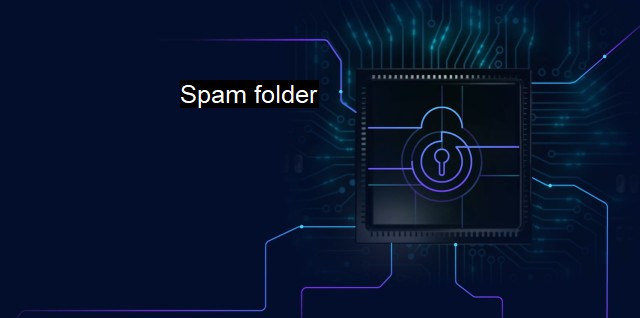What is Spam folder?
Understanding the Role of a Spam Folder in Cybersecurity: How Email Filters Combat Unwanted Messages and Protect Your Inbox
In the world of cybersecurity and antivirus solutions, the term "Spam Folder" refers to a designated location where unwanted or unsolicited messages are sequestered. Any email provider, be it Gmail, Yahoo, or Outlook, has a built-in feature commonly known as the "Spam Folder" or "Junk Email." These quarantine areas function as filters that help sort away potentially dangerous or irrelevant “junk” emails from a user’s main inbox.Understanding the context and functionality of a Spam folder is quite necessary when considering the broader discussion of cybersecurity. Corrosive elements, such as spam emails, can serve as a breeding ground for a wide range of cybersecurity threats that include, but are not limited to, malware, ransomware, phishing scams, and other forms of exploitative software designed to compromise the security of a user's device or network.
Primarily, the spam folder serves as the first line of defense against these toxic elements. Automatic filtering algorithms scrutinize every incoming email and based on certain identifying factors such as the sender’s address, subject line, or email content, classifies an email as spam or not. Sometimes, emails delivered from unknown senders or automated mailing lists you never subscribed to will likely be dispatched into your spam folder. In an instance where an email from a 'known' sender ends up in your spam folder, you have the ability to manually mark an email as 'not spam', thereby train the underlying email system to avoid such actions in the future.
Effective spam filtering is an imperative tool when it comes, not just to ensuring a clean and organized email inbox, but more critically, the overall online cybersecurity. Regular perusal and maintenance of the spam folder can preemptively thwart a lot of potential threats, by preventing harmful content from making its way into your regular inbox. Foiling an attack as early as at the spam folder level can save a user an immense amount of time, disruption, and data loss – not to mention the financial implications that often accompany cyber threats.
Spam folders are not completely foolproof. Cyber assailants continuously evolve at the same pace as cybersecurity measures, if not faster. Some sophisticated spam emails, designed to imitate trustworthy sources, might trick the email mechanism and slip through into the main inbox. And sometimes, these emails can catch the user off guard; the email may look like a regular promotional ad but can carry harmful malware or be a link to a deceitful phishing website, signifying sound reasons for users to invest in reliable antivirus programs.
An antivirus program armed with robust cybersecurity features operates from a different perspective to supplement and increase the effectiveness of a spam folder's filtering algorithm. It scans mails for malicious code or suspicious links and can quarantine or eliminate them before they even reach your computer or mobile device.
In this era of escalating cyber threats, understanding the role of a common feature like a Spam folder is important. While its primary purpose is to declutter your inbox from irrelevant, unwanted messages, it unwittingly plays a significant role as a powerful tool in users' cybersecurity arsenal. Coupled with the crucial assistance of an antivirus program, it amplifies the security measures in place that protect our online activities. Therefore, acknowledging and maintaining your spam folder isn't just about managing unwanted emails – it forms an integral part of nurturing robust digital hygiene in an increasingly interconnected and digital world.

Spam folder FAQs
What is a spam folder and how does it work?
A spam folder is a feature in email services that filters out emails that are suspected to be spam or unsolicited messages. The emails are redirected to a separate folder instead of being delivered to the recipient's inbox. The spam filter algorithm detects certain characteristics in the email, such as suspicious links or keywords, and flags them as spam.Why should I check my spam folder?
You should regularly check your spam folder to ensure that legitimate emails are not being filtered out. Sometimes, important emails may be mistakenly flagged as spam and sent to the spam folder. By checking your spam folder, you can prevent missing out on important communication, such as job offers, invoices or updates from your bank.Can an antivirus software help prevent spam emails?
Yes, antivirus software can help block spam emails by scanning incoming messages for potential threats and malicious content. The software can also detect and block suspicious links and attachments that could be used for phishing attacks.What can I do to reduce the number of spam emails in my inbox?
You can reduce the number of spam emails in your inbox by taking certain precautions such as not sharing your email address online or creating a separate email address for online subscriptions. You can also use filters or rules to automatically send certain emails to a designated folder, such as newsletters or promotional messages. Additionally, be cautious of clicking on links or downloading attachments from unknown senders.| | A | | | B | | | C | | | D | | | E | | | F | | | G | | | H | | | I | | | J | | | K | | | L | | | M | |
| | N | | | O | | | P | | | Q | | | R | | | S | | | T | | | U | | | V | | | W | | | X | | | Y | | | Z | |
| | 1 | | | 2 | | | 3 | | | 4 | | | 7 | | | 8 | | |||||||